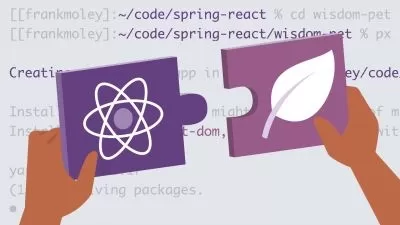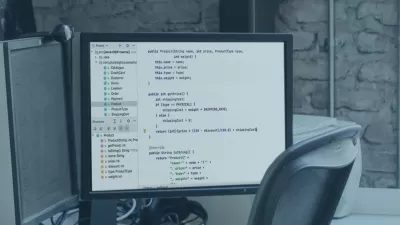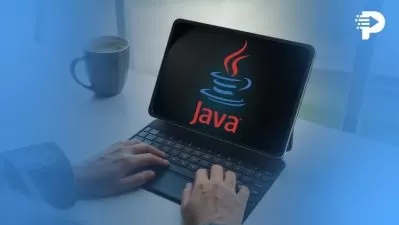Java Programming: Step by Step from A to Z
Holczer Balazs
8:56:25
Description
Everything you need to know about Java programming to make you first steps as a software engineer
What You'll Learn?
- Java programming fundamentals
Who is this for?
What You Need to Know?
More details
DescriptionThis course is about Java programming language. The Java Programming: Step by Step from A to Z course stands on its own but relies on the free beginner course so I strongly recommend that you start with the First Steps in Java FREE course and then continue with this course.
Curriculum
operators
wrapper classes
garbage collection
stack and heap memory
Strings
enums
date and time
generics theory and examples
collections and data structures
exceptions and errors
abstraction, encapsulation and polymorphism,
serialization
lambda expressions
Java streams theory and examples as well
multithreading theory and examples
design patterns
We are going to discuss the theory behind each concept and then we take a look at the concrete implementation in Java as well.
Thanks for joining the course, let's get started!
We are going to discuss the theory behind each concept and then we take a look at the concrete implementation in Java as well.
Thanks for joining the course, let's get started!
We are going to discuss the theory behind each concept and then we take a look at the concrete implementation in Java as well.
Thanks for joining the course, let's get started!
You will get lifetime access to 110+ lectures plus slides and source codes for the lectures!
This course comes with a 30 day money back guarantee! If you are not satisfied in any way, you'll get your money back.
So what are you waiting for? Learn Java in a way that will advance your career and increase your knowledge, all in a fun and practical way!
Who this course is for:
- Beginner programmers curious about Java programming language
This course is about Java programming language. The Java Programming: Step by Step from A to Z course stands on its own but relies on the free beginner course so I strongly recommend that you start with the First Steps in Java FREE course and then continue with this course.
Curriculum
operators
wrapper classes
garbage collection
stack and heap memory
Strings
enums
date and time
generics theory and examples
collections and data structures
exceptions and errors
abstraction, encapsulation and polymorphism,
serialization
lambda expressions
Java streams theory and examples as well
multithreading theory and examples
design patterns
We are going to discuss the theory behind each concept and then we take a look at the concrete implementation in Java as well.
Thanks for joining the course, let's get started!
We are going to discuss the theory behind each concept and then we take a look at the concrete implementation in Java as well.
Thanks for joining the course, let's get started!
We are going to discuss the theory behind each concept and then we take a look at the concrete implementation in Java as well.
Thanks for joining the course, let's get started!
You will get lifetime access to 110+ lectures plus slides and source codes for the lectures!
This course comes with a 30 day money back guarantee! If you are not satisfied in any way, you'll get your money back.
So what are you waiting for? Learn Java in a way that will advance your career and increase your knowledge, all in a fun and practical way!
Who this course is for:
- Beginner programmers curious about Java programming language
User Reviews
Rating
Holczer Balazs
Instructor's Courses
Udemy
View courses Udemy- language english
- Training sessions 105
- duration 8:56:25
- English subtitles has
- Release Date 2023/11/15











